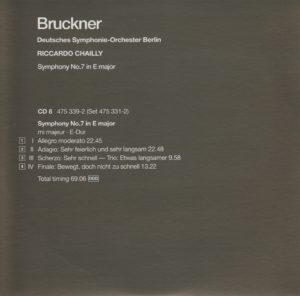 This morning’s conductor of Anton Bruckner’s Symphony No. 7 in E Major (WAB 107) is Italian Riccardo Chailly (1953-). The orchestra is Deutsches Symphonie-Orchester Berlin.
This morning’s conductor of Anton Bruckner’s Symphony No. 7 in E Major (WAB 107) is Italian Riccardo Chailly (1953-). The orchestra is Deutsches Symphonie-Orchester Berlin.
I had never heard of Riccardo Chailly before this project.
So, the first time I listened to him was on October 4th, Day 2, Symphony No. 1.
Then again on Day 18, Symphony No. 2.
Then again on Day 34, Symphony No. 3.
Then again on Day 50, Symphony No. 4.
Then again on Day 66, Symphony No. 5.
Finally, most recently, on Day 82, Symphony No. 6.
One of the reasons why I enjoy these projects I undertake from time to time (aside from the fact that I love music and movies and literature) is to learn as much as I can about the subject matter, including and especially – in this case – the conductors as well as the symphonies.
I usually post a lot of background for each symphony on the first day I listen to it. I did that yesterday (Day 97, Daniel Barenboim conducting). If you want to know more about Bruckner’s Seventh, let your mouse do the walking over to that page and read on.
As for me, right now, I’m going to plunge into Riccardo Chailly’s interpretation of Bruckner’s Symphony No. 7 in E Major…starting with just the facts:
 Bruckner’s Symphony No. 7 in E Major (WAB 107), composed 1881-1883
Bruckner’s Symphony No. 7 in E Major (WAB 107), composed 1881-1883
Riccardo Chailly conducts
Chailly used the ??? edition (no editor listed)
Deutsches Symphonie-Orchester Berlin plays
The symphony clocks in at 69:06
This was recorded at Jesus-Christus-Kirche, Berlin, Germany in June of 1984
Chailly was 31 when he conducted it (making him, to my knowledge, the youngest conductor in all of the 16 box sets in my 144-day project)
Bruckner was 59 when he finished composing it
This recording was released on the Decca label
Bruckner wrote his symphonies in four parts. The time breakdown of this one (Symphony No. 7 in E Major, version/editor unknown), from this particular conductor (Chailly) and this particular orchestra (Deutsches Symphonie-Orchester Berlin) is as follows:
I. Allegro moderato…………………………………………………………………………22:45
II. Adagio. Sehr feierlich und sehr langsam…………………………………..22:48
III. Scherzo. Sehr schnell…………………………………………………………………9:58
IV. Finale. Bewegt, doch nicht schnell……………………………………………13:22
Total running time: 69:06
Okay. What do I think of this performance?
My Rating:
Recording quality: 3
Overall musicianship: 3
CD liner notes: 3 (short essay in three languages, but incomplete edition information)
How does this make me feel: 2
I listened to this twice through this morning, which means I gave it over two hours of my time and attention.
In the end, I came away with these thoughts:
1. The brass instruments are too brassy,
2. The recording is somewhat muddy, not expansive and fresh,
3. The performance is kind of lethargic, not energetic and vibrant,
4. I noticed more of the Scherzo this time than I did with Barenboim’s interpretation yesterday, and was more intrigued by it,
5. I wasn’t hooked by the Adagio this time as I was yesterday with Barenboim,
6. This was a remarkably forgettable performance that didn’t improve with repeated listenings
All in all, I can’t recommend this performance of Bruckner’s Symphony No. 7 in E Major.
Your mileage may vary.
